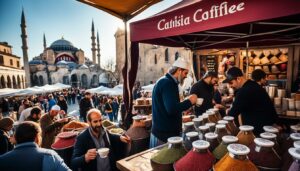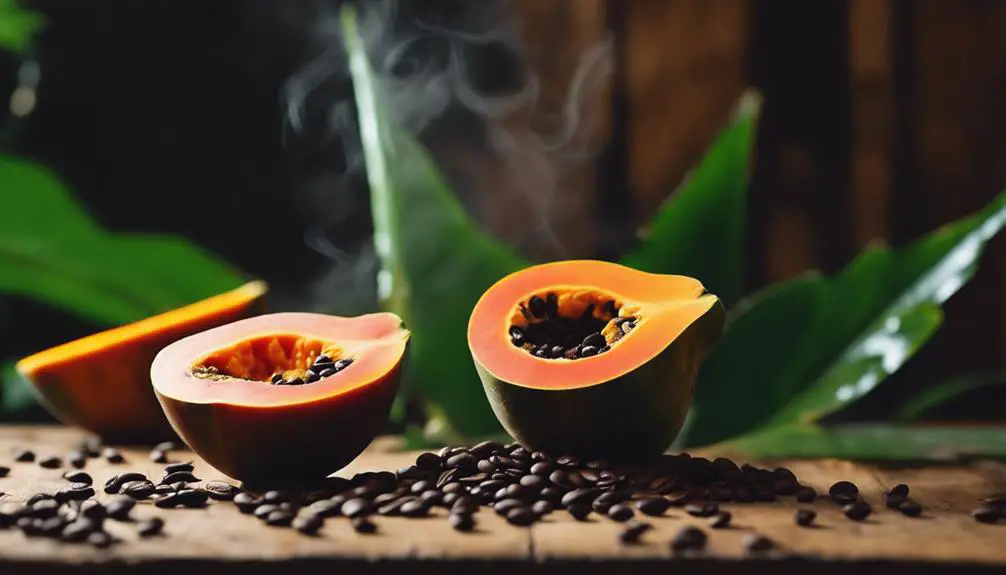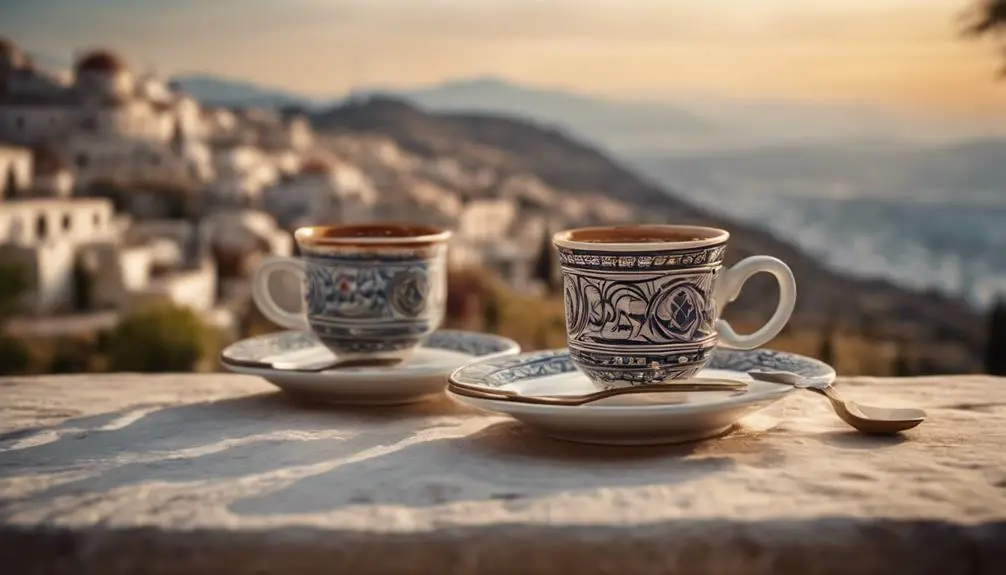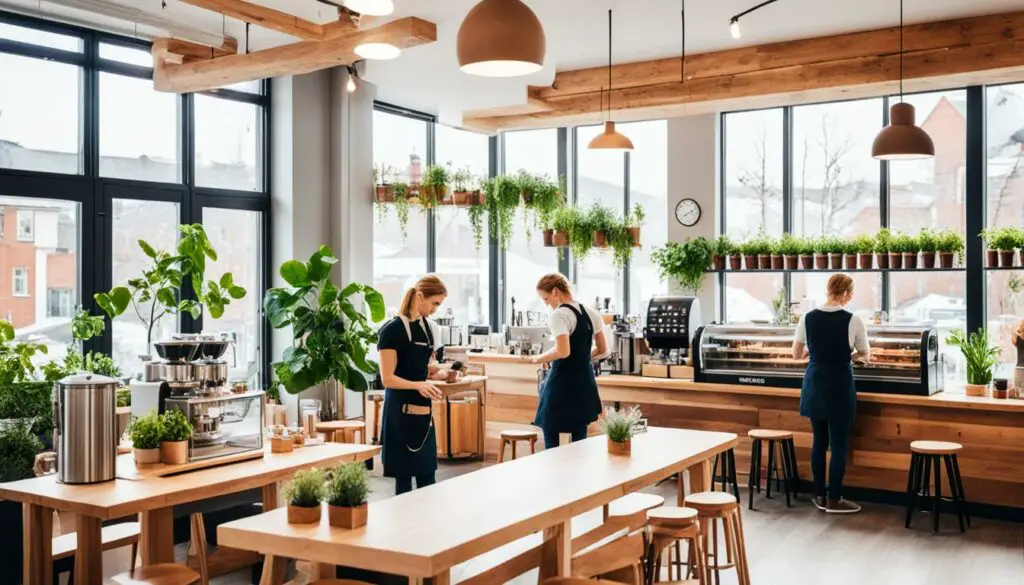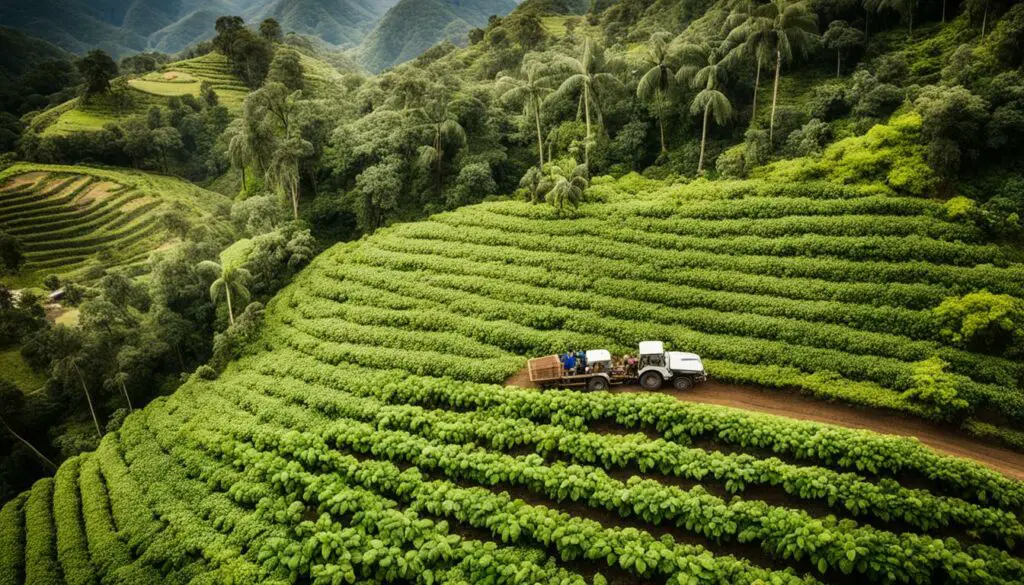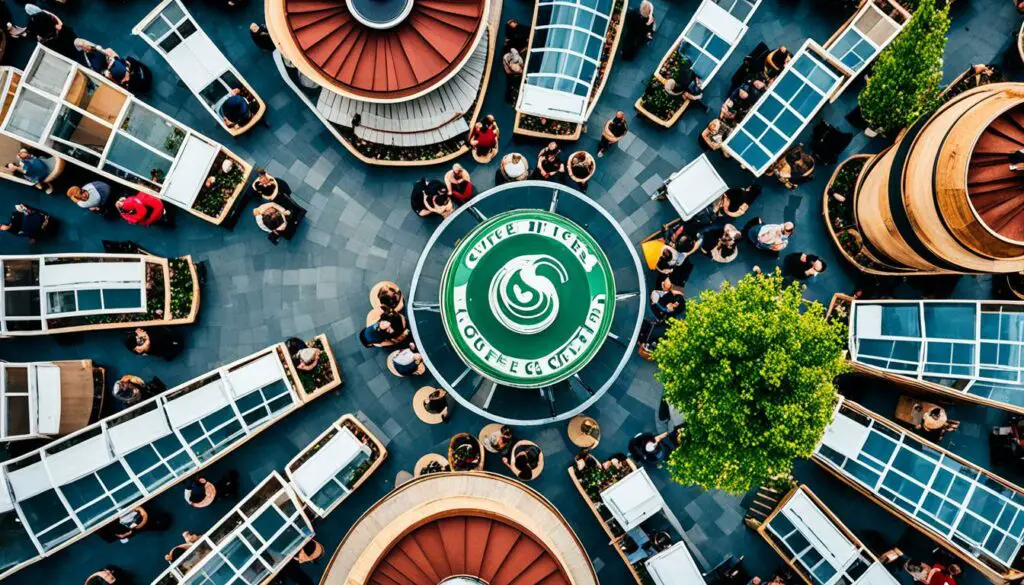Arabian coffee traditions in Jordan involve a series of detailed steps that hold great social and cultural significance. The process includes roasting coffee beans at specific temperatures, grinding them, and brewing them with special spices like cardamom.
This traditional drink, called Al-Qahwa, is usually served in small handle-less cups known as 'fenjans', a symbol of Jordanian hospitality. Offering Arabic coffee to visitors is a gesture of respect and unity, reflecting the dynamics of the host.
To conclude the experience, guests often compliment the host, a practice known as gahwaji. This reflects how the quality of coffee can mirror societal status in Jordan, showcasing the importance of this age-old tradition in the country.
Key Takeaways
Arabic coffee, also known as Al-Qahwa, holds a special place in Jordanian culture, symbolizing unity and respect during gatherings. In Jordan, the tradition of serving Arabic coffee, often done by a gahwaji, is highly valued as it reflects the host's status and hospitality. The process of brewing this coffee in Jordan is meticulous, involving roasting coffee beans at precise temperatures, grinding them, and then brewing them with aromatic spices like cardamom. Traditionally, Arabic coffee is served in small handle-less cups called fenjans, poured from a dallah, and accompanied by sweet dates. Jordan embraces both Arabian and Turkish coffee cultures, with Turkish coffee often preferred for intimate conversations among friends.
Understanding Arabic Coffee Origins

Arabic coffee, also known as Al-Qahwa, has its roots in the Arabian peninsula. It is prepared in two main styles: Turkish and Saudi coffee.
The Turkish method, popular in the Levant region, involves brewing coffee without sugar, which can be added later based on personal preference.
On the other hand, Saudi coffee is typically boiled and kept warm on coals, following a traditional Bedouin preparation style.
Coffee beans are roasted at temperatures between 165°C to 210°C and served in small cups called fenjan from a dallah, a special coffee pot.
Sometimes, various spices are added to enhance the flavor of the coffee.
Serving Arabic Coffee in Jordan
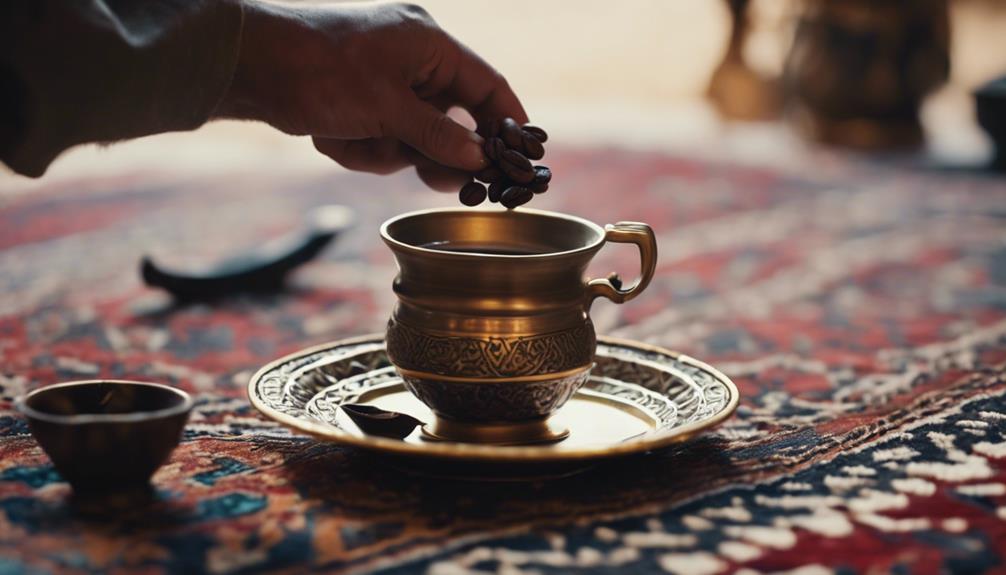
Serving Arabic coffee, known as Al-Qahwa, in Jordan is a cherished cultural tradition deeply intertwined with social gatherings and events. The task of serving this traditional coffee is often carried out by gahwaji, who are waiters dressed in special attire.
The process of serving Arabic coffee is highly meticulous and symbolic of hospitality, with the coffee usually accompanied by dates. This practice is common not only in private residences but also in upscale dining establishments.
The coffee is typically presented in small cups without handles, called fenjan, and poured from a unique coffee pot known as a dallah. In Jordanian culture, offering compliments when served Arabic coffee is essential, as any negative remarks could inadvertently offend the host.
The act of serving Arabic coffee transcends a simple beverage offering; it serves as a profound reflection of Jordan's enduring cultural values and traditions.
Decoding the Turkish Coffee Culture
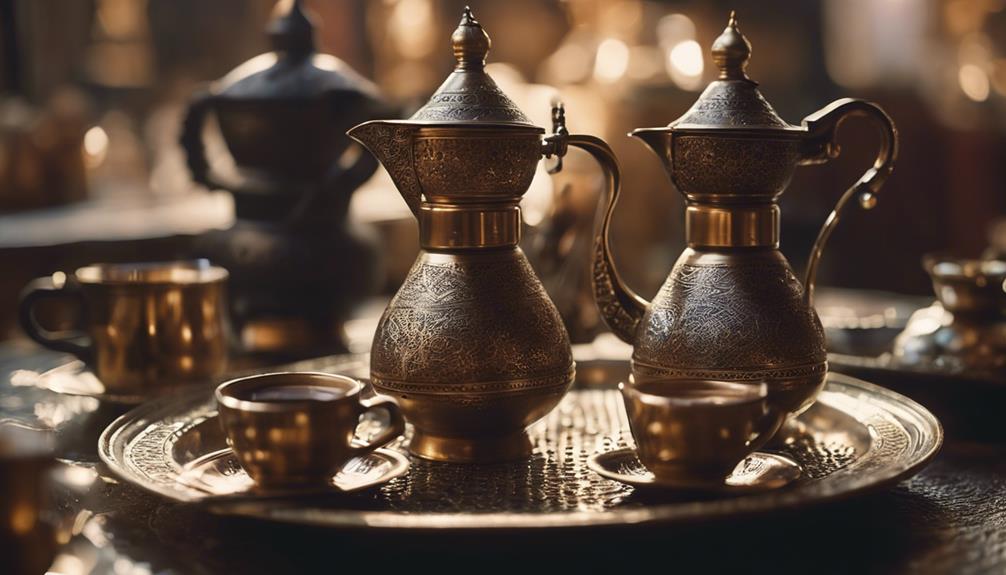
The Turkish coffee culture deeply ingrained in Jordan's beverage scene brings together tradition, symbolism, and rich flavors. This centuries-old tradition has become a part of everyday life and special gatherings, adding a touch of elegance and warmth to social interactions.
In Jordan, Turkish coffee is not just a beverage; it's a social ritual where people come together for intimate conversations over small cups of finely brewed coffee. The preparation process is meticulous, with attention to detail in every step, from grinding the beans to adding sugar and cardamom to create the perfect blend.
The art of serving Turkish coffee is equally important, with the coffee served in traditional cups known as 'fenjan,' symbolizing hospitality and respect for the guest. These small cups hold a symbolic meaning, reflecting the care and thoughtfulness put into every aspect of the coffee-drinking experience in Jordan.
Unveiling the Brewing Method
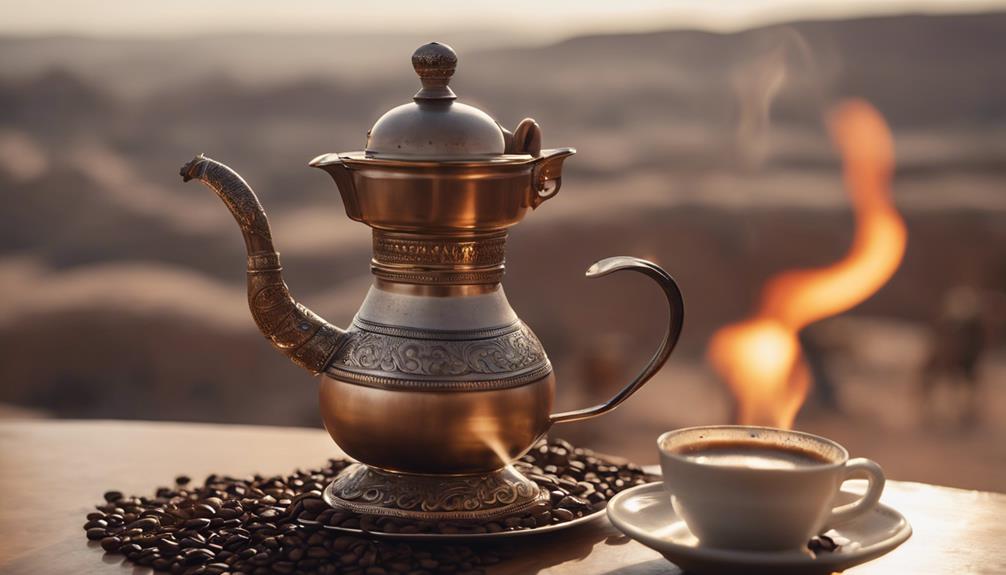
Brewing Arabic coffee in Jordan involves a special process that combines tradition and quality ingredients. The coffee beans are roasted at specific temperatures, ranging from 165°C to 210°C, which impacts the flavor. Guests often witness this roasting, adding to the experience.
After roasting, the coffee is ground and brewed with spices like cardamom, saffron, cloves, and cinnamon. The final coffee is served in small handle-less cups called fenjans, poured from a dallah, a traditional coffee pot. This meticulous method not only creates a unique taste but also highlights the cultural significance of coffee in Jordan.
Arabica Coffees Cultural Significance in Jordan
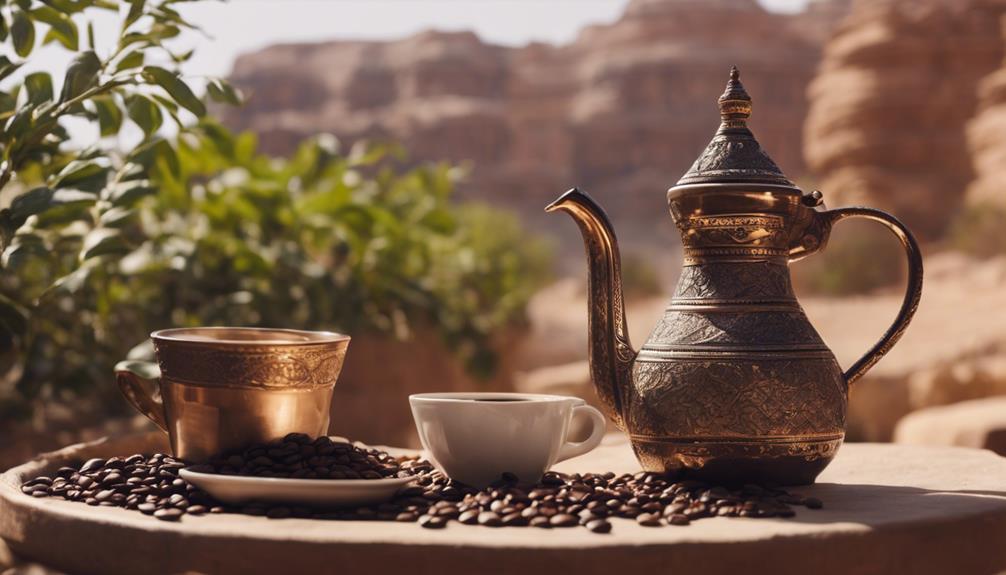
Arabica coffee holds a significant place in Jordanian culture, going beyond its brewing techniques to influence various social customs and behaviors in the country. Referred to as Al-Qahwa, Arabica coffee is not just a simple drink but a symbol of honor, friendship, and warm hospitality.
In Jordan, serving Arabica coffee to visitors is a customary gesture of welcome and respect. It is considered impolite to decline this offer, as it signifies a lack of appreciation for the host's kindness. Moreover, at social gatherings like weddings or funerals, the act of sharing coffee symbolizes unity and camaraderie among attendees.
The quality of the coffee served also plays a crucial role in reflecting the host's status and regard for their guests. Disparaging the coffee offered could lead to unintended social consequences, highlighting the importance placed on this traditional beverage in Jordanian society. Arabica coffee in Jordan serves not just as a drink but as a cultural emblem that fosters connections and upholds cherished values of hospitality and esteem.
Frequently Asked Questions
What Is the Significance of the Gahwaji's Traditional Attire in Serving Arabic Coffee?
The attire worn by the gahwaji holds great significance in the traditional serving of Arabic coffee. It not only reflects the deep cultural roots but also adds a sense of ceremony to the coffee-serving ritual within Jordanian society.
Are There Any Special Occasions or Ceremonies in Jordan Where Arabic Coffee Is Not Served?
Arabic coffee is a common sight at most social gatherings in Jordan. However, in some modern, Western-style events, you might find other beverages like cocktails or non-traditional coffees being served instead of the traditional Arabic coffee.
How Does the Taste of Arabic Coffee Differ When Roasted Lightly Versus Heavily?
Lightly roasted Arabic coffee offers a delicate and nuanced flavor profile, often highlighting fruity or floral notes. On the other hand, heavily roasted coffee presents a robust and intense flavor, with prominent bitterness and toasted qualities. The level of roasting significantly impacts the taste experience, catering to different preferences for coffee enthusiasts worldwide.
Are There Any Health Benefits Associated With Drinking Arabic Coffee?
Arabic coffee is known for its high antioxidant content, which may offer various health benefits. These may include improvements in heart health, increased mental alertness, and potential protection against conditions like Alzheimer's and type 2 diabetes.
Where Can One Buy Authentic Arabic Coffee Beans in Jordan?
You can find authentic Arabic coffee beans in Jordan at local markets like Souk Jara in Amman, as well as in specialty coffee shops or through reputable Jordanian online retailers known for their high-quality coffee products. These beans offer a rich and flavorful experience that is a must-try for coffee enthusiasts looking to savor the unique taste of Arabica coffee from the region. By exploring these local markets and shops, you can discover a wide variety of Arabic coffee beans that cater to your specific preferences, whether you enjoy a bold and robust flavor or a more delicate and aromatic profile. Don't miss the opportunity to indulge in the authentic taste of Arabic coffee by exploring these local sources in Jordan.
Conclusion
Arabian coffee culture in Jordan holds deep historical roots and carries significant societal importance. This longstanding tradition involves precise preparation techniques and specific ceremonial practices, serving as a distinctive cultural emblem.
Surprisingly, Jordanians on average consume 30 liters of coffee per person each year, showcasing the deeply entrenched nature of this practice. The veneration for coffee in Jordan emphasizes its cultural significance and its pervasive impact on society.




